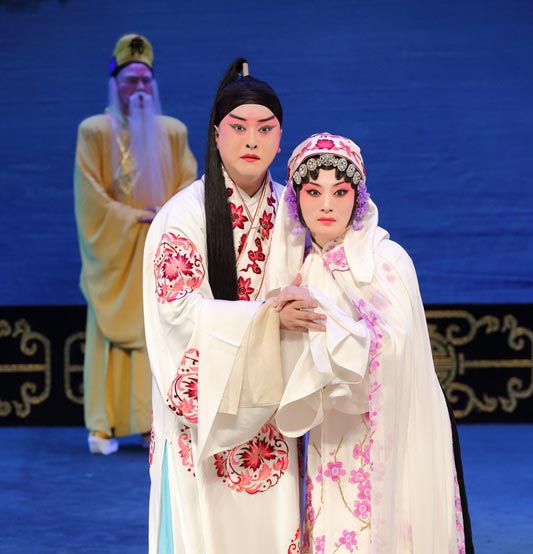'Paradise' blessed with immortal love stories
 |
|
Peking Opera performers interpreting the romantic story of Legend of the White Snake. [Photo by Kang Zheng/China Daily] |
There are so many poems from that era that the city could be the most literarily blessed of all Chinese places. Take the two causeways on West Lake, for example.
Bai Causeway was named after Bai Juyi, the great Tang Dynasty (AD 618-907) poet, and Su Causeway after Su Shi, aka Su Dongpo, the great Song poet. The two giants of Chinese literature were local governors who dredged the lake and built what look like ribbons around the priceless gift that is West Lake.
West Lake has been imitated to a fault but never surpassed. Beijing's Summer Palace and Old Summer Palace intended to replicate its layout, and many Chinese cities have namesake pools of water as long as they are located on the western side of the town. But only in Hangzhou is the lake the heart and soul of the city. Su called it "the eyes and eyebrows of the city".
Residents are intensely proud of it. I remember one winter morning as the city woke up to a night of dense snow. The whole town turned out voluntarily to remove the snow lest its burden denuded the trees of their branches and twigs.
More than three decades after I graduated, the city has become so much more enchanting. Polluting factories have been shut down, historical buildings lovingly restored, the lake water is now changed on a monthly basis by channeling the nearby Qiantang River, and the streets and boulevards have such dense leafy canopies that one gains the impression of walking or driving in a giant garden.
For my first visit to Hangzhou, in 1978, I had to take a seven-hour boat ride along the Grand Canal, a journey now shortened to half an hour on the freeway. When the canal was completed in AD 609, Hangzhou was still a small town with 1,500 households. Today, when you emerge from the southern terminus of the river, you'll find yourself in the midst of trendy high-rises and gleaming bridges, a sight that emperors of old could not envisage.
However, the 1,400-year-old river is not at all dwarfed by the symbols of modernity. In Hangzhou, old and new, past and present, nature and mankind are somehow held in uncanny and perfect balance.
















